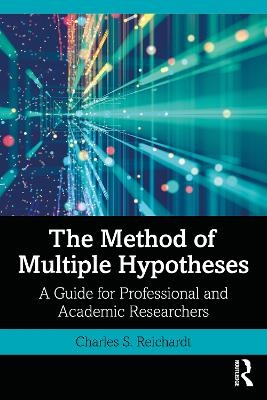
The Method of Multiple Hypotheses
Routledge (Verlag)
978-1-032-05460-5 (ISBN)
Author Charles Reichardt explains the method of multiple hypotheses using a range of real-world applications involving the causes of crime, traffic fatalities, and home field advantage in sports. The book describes the benefits of utilizing multiple hypotheses and the inherent limitations within which all methods must operate because all conclusions about nature must remain tentative and forever subject to revision. Nonetheless, the book reveals how the method of multiple hypotheses can produce strong inferences even in the face of the inevitable uncertainties of knowledge. The author also explicates some of the most foundational ideas in philosophy of science including the notions of the underdetermination of theory by data, the Duhem-Quine thesis, and the theory-ladenness of observation.
This book will be important reading for advanced undergraduates, graduates, and professional researchers across the social, behavioral, and natural sciences wanting to understand this method and how to apply it to their field of interest.
Charles S. Reichardt is Professor of Psychology at the University of Denver and a fellow of the Association for Psychological Science. He is a recipient of the President’s Prize from the Evaluation Research Society and the Tanaka Award from the Society of Multivariate Experimental Psychology. He is the author of Quasi-Experimentation: A Guide to Design and Analysis.
List of Figures
Acknowledgments
Chapter 1: Introduction
Chapter 2: The Hypothetico-Deductive Method
Chapter 3: The Method of Multiple Hypotheses
Chapter 4: Examples of the Multiple Hypotheses Method
Chapter 5: Advantages of the Multiple Hypotheses Method
Chapter 6: The Problem of Confirmation
Chapter 7: The Problem of Disconfirmation
Chapter 8: Abandoning Proof for Plausibility
Chapter 9: Justifying the Multiple Hypotheses Method
Chapter 10: Conclusions
References
Index
| Erscheinungsdatum | 22.10.2021 |
|---|---|
| Zusatzinfo | 6 Line drawings, black and white; 6 Illustrations, black and white |
| Verlagsort | London |
| Sprache | englisch |
| Maße | 156 x 234 mm |
| Gewicht | 176 g |
| Themenwelt | Geisteswissenschaften ► Psychologie ► Test in der Psychologie |
| Wirtschaft ► Volkswirtschaftslehre ► Ökonometrie | |
| ISBN-10 | 1-032-05460-3 / 1032054603 |
| ISBN-13 | 978-1-032-05460-5 / 9781032054605 |
| Zustand | Neuware |
| Haben Sie eine Frage zum Produkt? |
aus dem Bereich


